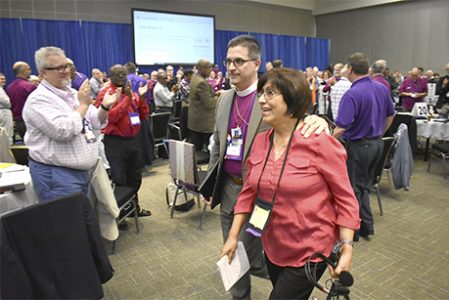…after historic votes

The Diocese of Cuba, which has been an independent diocese in full membership of the Anglican Communion since 1966, is to rejoin the US-based Episcopal Church (TEC). The decision was taken in two separate votes this week at TEC’s bicameral General Convention. The first vote was taken by the House of Bishops, which voted unanimously on Tuesday (10 July) to re-admit Cuba. The “debate” then moved to the House of Deputies – clergy and lay members representing the dioceses. Nobody had registered to speak against the proposal and, following a period of silence, the deputies voted unanimously to re-admit the diocese yesterday (Wednesday).
“Right now I feel that the Holy Spirit is blowing on this entire convention and that it is moving: It’s moving here for all of us to really work with it in this very difficult world to make sure that we fulfill the needs of this world,” the Bishop of Cuba, Griselda Delgado del Carpio, told the Deputies after the vote. “We meet like this in convention to put the family in order; that’s what’s behind it. And this is done so that we can welcome everyone.”
The Diocese of Cuba will join TEC’s Province II, which includes New York, New Jersey, Haiti and the Virgin Islands, once the agreed administrative and canonical requirements have been met.
The Episcopal Church of Cuba traces its origins back to an Anglican presence beginning in 1901. Today, there are some 46 congregations and missions serving 10,000 members and the wider communities. During the 1960s, Castro’s government began cracking down on religion, jailing religious leaders and believers, and it wasn’t until Pope John Paul II’s 1998 visit to Cuba, the first ever visit by a Roman Catholic pope to the island, that the government began a move back toward tolerance of religion.
TEC’s House of Bishops removed Cuba from membership in 1966 in response to the effects of the Cuban Revolution and the United States’ response. It was a moved that caused considerable pain that is still felt today.
The Cuban Revolution, led by Fidel Castro, began in 1953 and lasted until President Fulgencio Batista was forced from power in 1959. Batista’s anti-communist, authoritarian government was replaced with a socialist state, which in 1965 aligned itself with the communist party.
In 1961, Episcopal schools in Cuba had been closed and appropriated, and many clergy and their families were displaced. Some remained in Cuba; some either returned or immigrated to the US. Some clergy who remained in Cuba were imprisoned, executed or disappeared.
Church buildings were closed and left to deteriorate. The church was polarised politically, and its clergy and lay leaders suffered. But the church continued in the living rooms of the grandmothers, who held prayer services and Bible studies in their homes. Through them is transmitted a story of pain, and of faith.
Throughout this, the diocese continued its ministry as an independent diocese of the Anglican Communion. Metropolitical authority was exercised by a three-person Metropolitan Council comprised of the Primates of the US-based Episcopal Church, the Anglican Church of Canada, and the Church in the Province of the West Indies.
It will formally re-join TEC on a date decided by the Church’s Executive Council on receipt of a number of documents, including a revised constitution and a certified copy of “the Canons of the Diocese that conform in essential part to the Constitution and Canons of The Episcopal Church”. But in the transition period, the resolution passed by the General Convention admits the Bishop of Cuba to its House of Bishops with immediate effect and includes the dioceses clergy in TEC’s pension provision.
Most Anglican dioceses are part of 39 fully autonomous interdependent Churches, or Provinces. A small number are in extra-provincial churches: the Church of Ceylon, Bermuda, the Lusitanian Church, the Reformed Episcopal Church of Spain, and the Falkland Islands are extra-provincial under the authority of the Archbishop of Canterbury.
First Published on ACNS
July 12, 2018


